- Home
- Franklin Horton
Valley of Vengeance: Book Five in The Borrowed World Series Page 8
Valley of Vengeance: Book Five in The Borrowed World Series Read online
Page 8
Jim laughed. “No kidding.”
“Of the multitude of laws we’re violating, any guess as to which one they’re pulling us over for?” Buddy asked. “Maybe they noticed someone cut the Do Not Remove tag off the mattress on the roof?”
“No idea, but you know it can’t be good. I’m expecting it to be a shakedown of some sort.”
At first Jim looked for a wide spot where it would be safe to pull over. Then he realized that was a pointless consideration. There was no other traffic. He slowed and stopped in the middle of the road, honking the horn at Pops and Pete. When they saw what was going on, they stopped too.
Jim rolled down the power window and put both hands on the wheel. In his mirror, he could see one deputy get out and walk toward his window. In the other mirror, he could see a second deputy coming alongside Buddy.
“Keep your hands in sight,” Jim said. “Don’t give them any reason to get squirrelly.”
When the deputy reached his window, Jim looked down to see that the man’s hand was resting on his gun but it wasn’t drawn. His name badge said Ford. Jim had seen the man but didn’t know him. It was a small town; eventually you would lay eyes on everyone. There were only so many grocery stores, gas stations, and places to eat.
“Can I help you, Deputy?” Jim asked.
The deputy was wearing sunglasses that prevented Jim from seeing where he was looking. He didn’t answer at first. Jim sensed the man was attempting to intimidate him like he might a young punk pulled over speeding but Jim didn’t intimidate easily. He’d been through too much. Jim suspected this man had never even drawn his gun on the job. At this point, Jim had quit counting the men he’d had to kill. There were better things to keep track of and he didn’t think he was done killing.
Still, this didn’t need to go south. Jim had his son and his dad to be concerned about. There were too many nervous men and nervous guns. Jim forced himself to take a deep breath, to try and push the adrenaline back to where it came from.
The deputy cleared his throat. “I couldn’t help but notice the load you were hauling down the road. I’m assuming you have a legal right to all this stuff?”
“It’s not stolen if that’s what you’re asking,” Jim replied. “It’s my dad’s stuff. He’s in that UTV so you can ask him yourself if you want. I’m moving him and my mom out to my house so I can keep a better eye on them. They don’t get around like they used to.”
The deputy nodded. “Where do you live?”
Jim hesitated. “I’m not sure that’s completely relevant.”
The deputy scratched his chin. “Then I’ll need to see your license and registration.”
Jim sighed. “Look, I don’t have them with me. You can run my tags and see that the truck is legal, and that my license is in order.”
“The network is down. I can’t look anything up,” the deputy replied.
Jim had assumed that. “Then why would you need to see my license? There some reason you need to know where I live?”
The other deputy was losing patience and slammed his palm against the passenger door, startling everyone. “He needs to know where you live because he fucking asked!” Deputy Deel shouted. Jim turned to see the man red-faced and glaring at him.
“Relax, Deputy,” Buddy said. “No need for everyone to get on edge. It’s clear that no one trusts anyone anymore. We respect the law. We’re just a little nervous about sharing information. Surely you can understand that. You just tell us what your concerns are and we’ll see if we can put them to rest.”
Deputy Deel was still red. His mouth was screwed tight, like he was ready to pull the men out and rough them up. Buddy was unperturbed. He’d lost everything in the world. He’d killed men and burned another to death. What could these men do to him that the world had not put him through already? It made no difference to him if he died today, tomorrow, or next year.
“We just want to make sure that this stuff isn’t stolen,” Deputy Ford said.
Everyone present knew that was not the entire truth. Ford had obviously decided to soften his approach a little. Maybe he didn’t want things to get out of hand either.
“Then talk to my dad,” Jim said, gesturing at the UTV. “He’ll tell you this is his stuff. Then we can be on our way.”
Deputy Ford looked at Jim as if to tell him that the decision as to whether that would resolve matters was not Jim’s to make, but he didn’t voice it. Instead the deputy strolled forward to the UTV and addressed Pops.
Jim could not hear what they were saying but watched intently. There was a lot that could go wrong. They were driving an off-road vehicle on the public roadway while openly carrying guns. Jim was trying to work out in his head if he could shoot Deputy Deel and then manage to get an angle on Deputy Ford beside the UTV if he had to. It would not be easy and he was not comfortable with part of his family caught in the crossfire.
Sensing the growing tension and perhaps even Jim’s violent plans, Buddy sought to deescalate things. If nothing else, maybe talking to the deputy would distract him enough to give them an advantage is shooting did break out. “How are your families holding up at the superstore, Deputy…Deel?”
Deputy Deel was moving his eyes back and forth between the cab of the truck and the UTV. He seemed to expect that the inevitable result of all this tension would a boiling over into violence. He had his hand on his weapon and nervousness poured off him like the reek of cheap aftershave. In truth, Deputy Deel probably wasn’t cut out for this. Jim sensed he might have realized that eventually had things not collapsed and left him stuck as a cop for the duration of it. Perhaps he would have sold insurance or installed satellite dishes.
“I’m not one of them,” Deputy Deel said with contempt.
Buddy turned slightly, a question in the quick glance he shot at Jim. He turned back to the Deputy. “What do you mean?”
“We’re not all at the superstore,” the Deputy said. “Neither is Ford. Not everybody thought that was the right thing to do.”
“What did the sheriff do?” Jim asked. “Is he with them at the superstore?”
“Nah,” the deputy responded. “We all probably would have gone if it hadn’t have been for the sheriff. He didn’t think it was right to take over a resource like that and not share the supplies. We all had to make the decision whether we were going to side with him or go with the other guys that took over the store.”
“What was the ratio?” Jim asked.
“The what?” the deputy asked.
“How many went, how many stayed?”
“Oh, more went,” Deputy Deel replied. “There’s probably a dozen cops at the superstore right now. Deputies, town cops, even a few staties. There’s just a couple of us left that didn’t go.”
“Those guys at the superstore still helping out?” Buddy asked. “They still answer calls?”
Deputy Deel looked at Buddy like he was an idiot. “There ain’t no more calls. We just try to patrol and see what help we can offer folks, which ain’t much. And no, those guys ain’t helping at all. I don’t know what they’re doing anymore. I’m not sure I want to know either.”
Jim nodded at that. He didn’t know what to think. It was good to know that there were cops who weren’t part of that group at the superstore. At the same time, it was disturbing to know that the group at the superstore had given up acting in any official capacity. They were nothing more than another force. They were armed and trained men. If for any reason he had to fight those men, he would probably lose.
Ahead, he saw Deputy Ford smiling and extending a hand to Pops. They shook and Pops patted the man on the back. Jim was sure that Pops knew the man in some capacity, but certainly they’d passed on the road a lot with the man’s office being close to their house. When Deputy Ford started back, Pops folded himself into the UTV again and Pete started it up.
“We done here?” Jim asked when the deputy reached his window.
Ford smiled at him. Jim was surprised at the change in demeanor.
/>
“Yeah, you can go,” Deputy Ford said, stopping at the window. “Glad to hear that things are going well in the valley.”
Jim couldn’t hide his shock and that clearly amused Deputy Ford. The deputy tipped his hat at Jim. “You have a good day now.” He walked off, having clearly enjoyed the moment.
“My dad told him,” Jim said after they were gone.
“Your dad doesn’t think like you do,” Buddy said. “I’m sure he didn’t realize there was an ulterior motive to their questions.”
“I’m sure he didn’t either,” Jim said. “I think we probably don’t need to bring him out into town anymore. He’s too social. He doesn’t keep secrets well.”
“Too late to worry about it now,” Buddy said, propping his arm up in the window.
Ahead of them, Pops leaned out of the cab of the UTV and gave them a thumbs up to see if they were ready to leave. Jim waved back at him, a bitter smile on his face.
Chapter 16
Town
Back in their cruiser, Deputy Ford picked up the car radio’s microphone and hit the transmit button. “Unit Sixty-One to One.”
The reply was almost immediate. “One here,” the sheriff said. “I was waiting on you guys. Had a bad feeling about this one.”
Before the sheriff could say anything else, Ford began spilling the details. “The son wouldn’t tell me anything but the old guy spilled it,” Ford said. “Those guys came up with a tanker of diesel somehow. He said it’s still nearly full.”
“Do not say another word,” the sheriff said.
“You know we’re about out of diesel,” Ford said. “If we run out we lose power, communications, everything.”
“You’re on an open channel, you idiot,” the sheriff spat. “You come directly to my house now and do not use your radio again until you’ve talked to me. Unit One out.”
Deputy Ford looked sheepishly over at Deel. “Hell, I was just excited. You think he would be too. A tank of diesel could hold us for a while. We could start driving that MRAP around again.”
“The others, at the superstore could be thinking the same thing,” Deel said.
Only then did Ford’s mistake hit him. He’d essentially done the same thing the old man in the UTV did. In his excitement, he’d inadvertently shared vital information with people competing for resources. His mind raced. The other group would no doubt be interested if they’d intercepted the transmission.
“Let’s get to the sheriff’s house,” Ford said.
As Ford started the vehicle and accelerated toward town, that very group of officers they’d been concerned about was scrambling just as fast. Like many communities, Russell County gave money to support a local amateur radio club. This funding helped assure that there would be people capable of building and supporting a communication network in a disaster. The group of former law enforcement officers holed up at the superstore in town had understood the critical nature of communication networks early on.
For that reason, they reached out to one of the members of the local amateur radio club soon after moving into the superstore. His name was Hugh and he was a wizard when it came to radios. The cops residing at the store helped him seize the club’s equipment and move it into their compound. They erected a series of antennas on the roof of the building and ran the wiring down through a roof hatch. In exchange for regular meals and a roof over his head, Hugh moved in with them at the store and worked the radios all day long and through much of the night. He seemed to derive an energy from the work that left him requiring little sleep.
Hugh set up a pop-up awning in the middle of the store. Beneath it he established a semi-circle of plastic folding tables and covered them with an impressive looking array of radio gear. He sat on a rolling office chair in the middle of it, shuttling from table to table when something caught his attention. He worked with the intensity of a man singlehandedly running a spaceship.
The radio operator was a person that at first glance no one would suspect of being capable of the operation of complex electronics. He had a scraggly beard that hung to his belly and matted black hair that hung just as far down his back. His blue eyes appeared to be too large and made him look a little crazy. He was tall and thin, with lanky limbs, and an intense, unblinking gaze that further contributed to the idea he may be a little off center. He wore a Vietnam-era boonie hat and a camouflage jacket that made people wonder if he’d served in the military but no one could ever get a straight answer out of him as to whether that had been the case or not. Despite appearances, he was a hell of a radio operator.
He seemed to effortlessly understand the obscure and mystical formulas behind antenna design and placement. He required no manuals or references, spouting computations and data off the top of his head. He could play knobs, dials, and buttons like a piano to pull in distant signals and clear garbled transmissions. He operated with a headset on most of the time, which made faint signals easier to hear. Even though people couldn’t hear what he was listening to, there was usually an audience watching him, drawn irresistibly by the intensity of Hugh’s focus. He sat there all day most days, picking up snippets of information about the world at large and the situation locally. Unfortunately for them, most of the information was useless.
When Hugh picked up Deputy Ford’s transmission to the sheriff, he knew he had something. His audience knew he had something too, seeing the already large eyes swell to even larger proportion. Hugh’s eyes began racing frantically within their sockets, processing the information he was hearing. Some of his audience rose to their feet, sharing in the frenetic energy of his excitement while still having no idea from where it was borne.
At the end of the transmission, Hugh slid his headphones down until they hung around his neck. He turned to a young boy of around ten who was standing nearby, anxious to hear what had taken place within the confines of the headset.
“Get your dad,” Hugh said. The words came out slowly and with tremendous gravity.
The boy raced off, arms pumping, feet kicking, as if lives hung in the balance. Shortly, he returned with his dad, a deputy named Barnes. Early in the disaster, Barnes had been assigned to guard a large gas station in a remote section of the county. Aware there weren’t many witnesses around to what took place there, Barnes began his own black market, trading fuel for food, weapons, and any other goods he thought he could use.
There were two of them guarding the station in shifts and Barnes soon got the other deputy in on it. Eventually word leaked out about the sweet deal Barnes had going. The sheriff pulled him out of the station, threatened his job, and gave the duty to another officer. Barnes was fine with it. He’d nearly exhausted the station’s fuel supply anyway. He was already looking for a new angle to take advantage of. As far as losing his job went, Barnes thought the sheriff must have been the only one that hadn’t noticed that trying to maintain law and order was a lost cause now. They couldn’t keep people safe with ten times the force they had.
The sheriff ended up stationing at Barnes at the superstore after his failure to secure the gas station. The sheriff hoped that he had enough men working at the location that they’d exert a little pressure on Barnes to operate in an honest, above-board fashion. The superstore was still trying to conduct business but maintaining order required a tremendous effort on the part of the four officers stationed there.
Without power, the loss detection equipment didn’t work. People were carrying goods out every door, right under the noses of the cops. They couldn’t cover every exit all the time. When their frustration boiled over at being powerless to stop the stealing, Barnes put forth the idea that maybe they should just take the store for themselves. After all, they couldn’t provide any security for the town if they didn’t have food and gear. They couldn’t concentrate on keeping the peace if they were worried about their families’ safety. The only reasonable avenue left to them was to take over the store and the remaining supplies, move their families in, and establish a secured compound where they c
ould weather the storm.
“What is it?” Barnes asked when he reached the crowd assembled around the radio operator. He was anxious to hear what the man had found. While the radio operator had shared bits of information with them he’d gleaned from the airwaves, he’d never demanded their immediate attention for an item of news.
Hugh brushed his beard thoughtfully, staring Barnes in the eye. “I picked up a transmission from one of the other cops. They just had a contact with someone who they suspect had a tanker of fuel.”
“Who?” Barnes barked.
“No idea,” Hugh said, shaking his head. “There were no names used and the sheriff made them shut down the transmission before they said anything else.”
“Was it someone they’d pulled over?”
Hugh shrugged. “Not enough information, but it did sound something like that.”
Barnes turned away and scanned the crowd, looking for someone in particular. “Sword!”
“Right here,” replied a man in camo hunting overalls, throwing a hand up.
“Get that drone up over the center of town,” Barnes said. “I need to see if anything is moving out there. If they pulled over someone with access to a tanker of fuel, I want to know who it is.”
“You got it,” Sword said, jogging away.
“Stay on that radio, Hugh,” Barnes ordered. “If you hear anything else, you let me know immediately.”
Hugh gave a casual salute, slid the headphones back over his ears, and immersed himself again in his radios. Barnes strode through the building, lit only by the bright sun pouring through the skylights. At the front of the store, the automatic doors were jammed open and Barnes hit the parking lot about the same time Sword backed away from the suitcase-sized drone he’d placed on the asphalt, operating controls on the remote hanging around his neck. The drone began to whine with increasing intensity, then shot upward with surprising speed.
Barnes moved to the lowered tailgate of a sheriff’s department pickup and joined a group of men watching a portable LCD monitor. The screen displayed images broadcast from the cameras on the drone. All eyes were on the screen as Sword put the drone high over the small town. He rotated it, catching scenes from the only two streets that ran the length of the town.

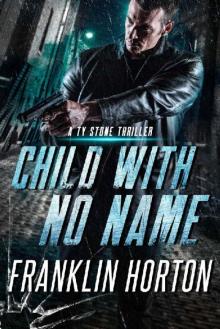 Child With No Name
Child With No Name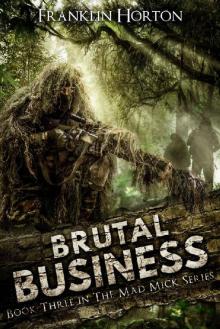 Brutal Business: Book Three in the Mad Mick Series
Brutal Business: Book Three in the Mad Mick Series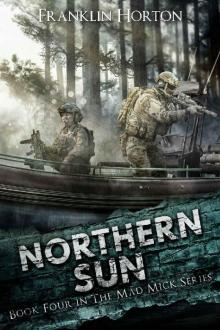 Northern Sun: Book Four in The Mad Mick Series
Northern Sun: Book Four in The Mad Mick Series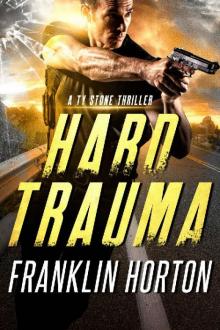 Hard Trauma
Hard Trauma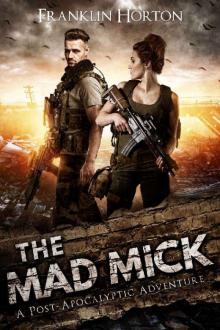 The Mad Mick: Book One of The Mad Mick Series
The Mad Mick: Book One of The Mad Mick Series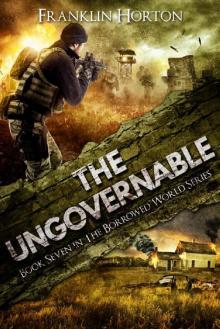 The Ungovernable
The Ungovernable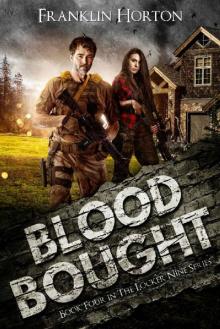 Blood Bought: Book Four in The Locker Nine Series
Blood Bought: Book Four in The Locker Nine Series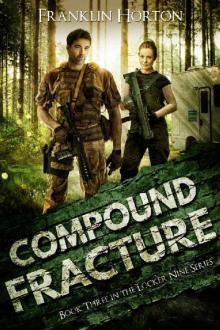 Compound Fracture
Compound Fracture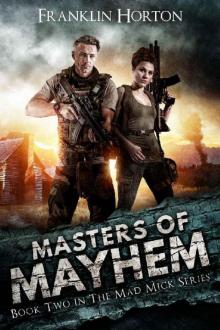 Masters of Mayhem
Masters of Mayhem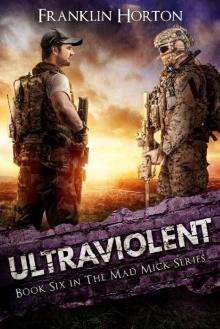 Ultraviolent: Book Six in The Mad Mick Series
Ultraviolent: Book Six in The Mad Mick Series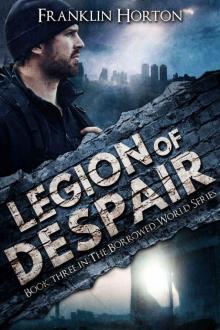 The Borrowed World (Book 3): Legion of Despair
The Borrowed World (Book 3): Legion of Despair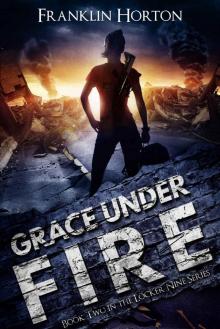 Grace Under Fire: Book Two In The Locker Nine Series
Grace Under Fire: Book Two In The Locker Nine Series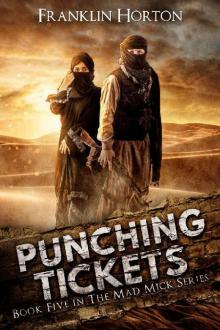 Punching Tickets: Book Five in The Mad Mick Series
Punching Tickets: Book Five in The Mad Mick Series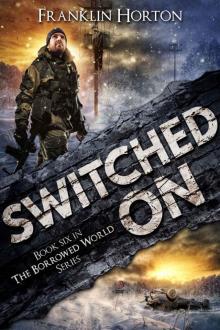 Switched On: Book Six in The Borrowed World Series
Switched On: Book Six in The Borrowed World Series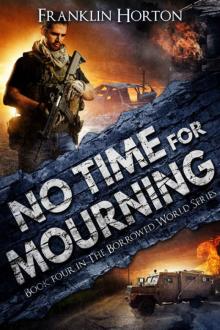 No Time For Mourning: Book Four in The Borrowed World Series
No Time For Mourning: Book Four in The Borrowed World Series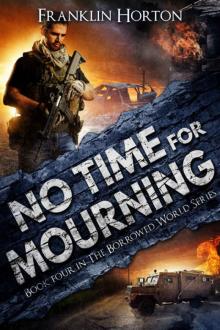 The Borrowed World (Book 4): No Time For Mourning
The Borrowed World (Book 4): No Time For Mourning Random Acts
Random Acts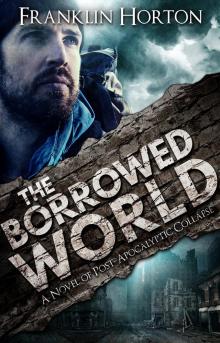 The Borrowed World: A Novel of Post-Apocalyptic Collapse
The Borrowed World: A Novel of Post-Apocalyptic Collapse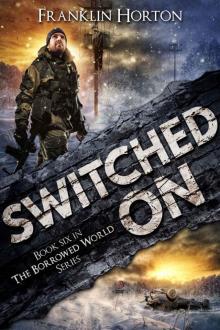 Switched On
Switched On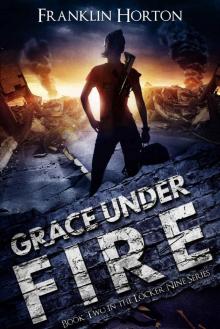 Grace Under Fire
Grace Under Fire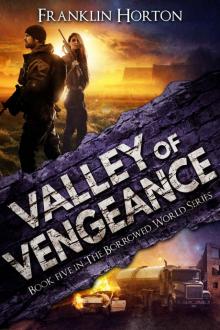 Valley of Vengeance: Book Five in The Borrowed World Series
Valley of Vengeance: Book Five in The Borrowed World Series